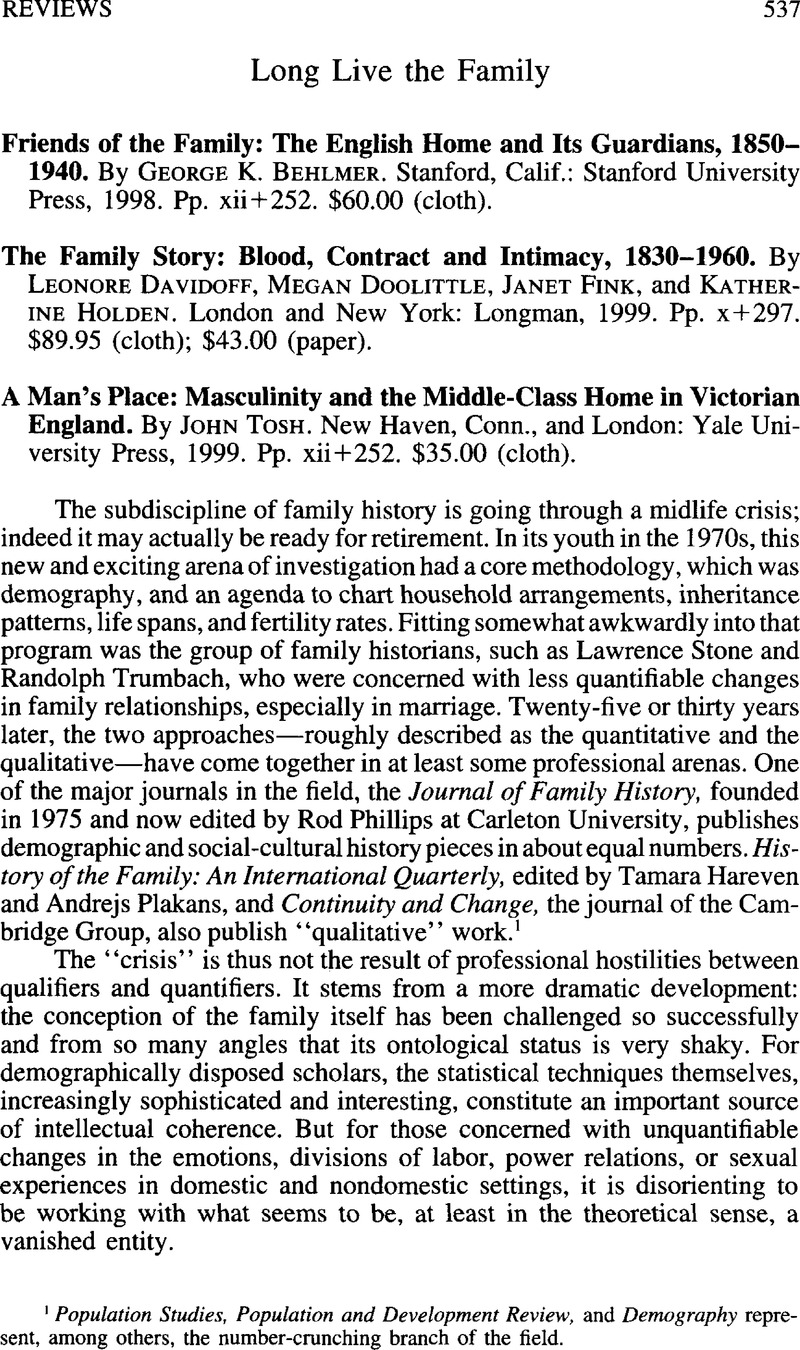No CrossRef data available.
Article contents
Long Live the Family - Friends of the Family: The English Home and Its Guardians, 1850–1940. By George K. Behlmer. Stanford, Calif.: Stanford University Press, 1998. Pp. xii+252. $60.00 (cloth). - The Family Story: Blood, Contract and Intimacy, 1830–1960. By Leonore Davidoff, Megan Doolittle, Janet Fink, and Katherine Holden. London and New York: Longman, 1999. Pp. x+297. $89.95 (cloth); $43.00 (paper). - A Man's Place: Masculinity and the Middle-Class Home in Victorian England. By John Tosh. New Haven, Conn., and London: Yale University Press, 1999. Pp. xii+252. $35.00 (cloth).
Published online by Cambridge University Press: 10 May 2013
Abstract

- Type
- Reviews
- Information
- Copyright
- Copyright © North American Conference of British Studies 2002
References
1 Population Studies, Population and Development Review, and Demography represent, among others, the number-crunching branch of the field.
2 For examples of the disaggregating of couples, see some of the contributions to Gillis, John R., Tilly, Louise A., and Levine, David, eds., The European Experience of Declining Fertility: A Quiet Revolution, 1850–1970 (Oxford, 1992)Google Scholar, particularly those by Angus McLaren, Wally Seccombe, and Jane and Peter Schneider. My own contribution, “Mothers and the State in Britain,” probably lays too much stress on how many children wives desired as a factor in the fertility decline. The position that sex and contraception were primarily a man's business before World War II at any rate is very well put by Fisher, Kate, in “‘She Was Quite Satisfied with the Arrangements Made’: Gender and Birth Control in Britain, 1920–1950,” Past and Present, no. 169 (2000): 161–93Google Scholar.
3 The classic statements of this position, from around 1980, are Lasch, Christopher, Haven in a Heartless World: The Family Besieged (New York, 1979)Google Scholar; Donzelot, Jacques, The Policing of Families (New York, 1979)Google Scholar; and Mount, FerdinandThe Subversive Family: An Alternative History of Love and Marriage, trans. Robert, Hurley (London, 1982)Google Scholar.
4 This was one of the points that my colleagues and I made in an early Feminist Studies article attacking the assumptions of family history. At that time we had only a few examples of histories of family-related issues that took gender into consideration. See Rapp, Rayna, Ross, Ellen, and Bridenthal, Renate, “Examining Family History,” Feminist Studies 5, no. 1 (1979): 174–200CrossRefGoogle Scholar.
5 Davidoff, Leonore and Hall, Catherine, Family Fortunes: Men and Women of the English Middle Class, 1780–1850 (Chicago, 1987)Google Scholar.
6 Smith-Rosenberg, Carroll, “The Female World of Love and Ritual: Relations between Women in Nineteenth-Century America,” Signs 1, no. 1 (1975): 1–29CrossRefGoogle Scholar.
7 An excellent review of the contributions of feminist scholars to family history in Canada demonstrates not only the vitality of this branch of scholarship but also the ways in which the nuclear family and its reproduction model have been changed by this new generation. See Bradbury, Bettina, “Feminist Historians and Family History in Canada in the 1990s,” Journal of Family History 25, no. 3 (2000): 362–83CrossRefGoogle Scholar. Megan Doolittle, on the other hand, has written a similar piece on British history, arguing that few gender scholars locate themselves as part of the subprofession of family history; see her “Bringing Together Gender and Family in English History,” Gender and History 11, no. 3 (1999): 542–54CrossRefGoogle Scholar.
8 Behlmer, George, Child Abuse and Moral Reform in England, 1870–1908 (Stanford, Calif., 1982)Google Scholar.
9 Gillis, John R., A World of Their Own Making: Myth, Ritual, and the Quest for Family Values (New York, 1996)Google Scholar, particularly the introduction.




